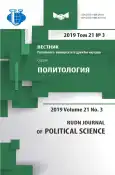Участие молодежи в нигерийской политике: возрастные и гендерные различия (восприятие сообщества Иджебу-Оде)
- Авторы: Олубела А.1, Юнаде О.1, Огунсанья А.1
-
Учреждения:
- Университет Олабиси Онабанджо
- Выпуск: Том 21, № 3 (2019)
- Страницы: 421-429
- Раздел: ПОЛИТИЧЕСКИЕ ПРОЦЕССЫ В СОВРЕМЕННОМ МИРЕ
- URL: https://journal-vniispk.ru/2313-1438/article/view/339719
- DOI: https://doi.org/10.22363/2313-1438-2019-21-3-421-429
- ID: 339719
Цитировать
Полный текст
Аннотация
Важность участия молодежи в политических процессах и процессах развития общества трудно переоценить. Однако, несмотря на большой процент молодежи в демографической структуре Нигерии и историческую важность преемственности поколений с акцентом на национальную идентичность, сравнительно мало известно о степени участия молодежи в политике страны. В статье в форме описательного опроса анализируются гендерные и возрастные параметры участия молодежи в нигерийской политике. Авторы использовали метод случайной выборки при отборе 200 молодых людей из 5 политических палат (по 40 из каждой палаты) в районе местного самоуправления Иджебу-Оде штата Огун. Также для сбора данных был разработан и использован опросник, а для проверки трех выдвинутых авторами гипотез на уровне значимости 0,05 использовались t -критерий Стьюдента и дисперсионный анализ (ANOVA). Проведенное исследование не выявило значимых гендерных ( t = 1.56, P > 0.05) или возрастных различий ( t = 1.44, P > 0.05) среди молодого населения Нигерии, активно занимающегося политической деятельностью. В заключение предлагаются рекомендации для правительства Нигерии - направить усилия на борьбу с неграмотностью и безработицей в стране, поскольку они являются основными причинами вандализма, бессмысленного насилия, анархизма, рэкета и культизма среди нигерийской молодежи, а также способствовать формированию реальных политических организаций под контролем и руководством молодежи страны.
Ключевые слова
Об авторах
Афолаби Олубела
Университет Олабиси Онабанджо
Автор, ответственный за переписку.
Email: afolabi.olubela@oouagoiwoye.edu.ng
кандидат социологических наук, преподаватель кафедры преподавания гуманитарных и социальных наук
Аго-Ивойе, Штат Огун, НигерияОлуфунмилайо Юнаде
Университет Олабиси Онабанджо
Email: iyunade.funmi@oouagoiwoye.edu.ng
кандидат педагогических наук, старший преподаватель кафедры преподавания гуманитарных и социальных наук
Аго-Ивойе, Штат Огун, НигерияАдеола Огунсанья
Университет Олабиси Онабанджо
Email: adeola.ogunsanya@oouagoiwoye.edu.ng
преподаватель кафедры преподавания гуманитарных и социальных наук
Аго-Ивойе, Штат Огун, НигерияСписок литературы
- Ogbeide F.O. Youths’ Violence and Electoral Process in Nigeria’s Fourth Republic: A Case Study of Ota, Ogun State, Nigeria. International Journal of Education and Research. 2013; 1 (9): 1—14.
- Bolaji K. Toward Institutionalizing Credible Elections in Nigeria: A Review of Reform Measures by the Independent National Electoral Commission. International Institute for Democracy and Electoral Assistance Improving Electoral Practices: Case Studies and Practical Approaches. International IDEA; Stockholm; Sweden; 2015.
- Aghedo I. Old Wine in a New Bottle: Ideological and Operational Linkages between Maitatsine and Boko Haram Revolts in Nigeria. African Security. 2014; 7 (4): 229—250.
- Sommers M. Urban Youth in Africa. Environment and Urbanization. 2010; 22 (2): 317—332.
- Osumah O., Aghemelo A.T. Elections in Nigeria since the End of Military Rule. Africana. 2010; 4 (2): 9—64.
- Mutisi M. Interrogating Traditional Youth Theory: Youth Peacebuilding and Engagement in Post-conflict Liberia. African Centre for the Constructive Resolution of Disputes. South Africa; 2012.
- Chidiogo E. Opinion: The Role of Youth in Ensuring Credible Elections. The Guardian. 14.02.2015.
- Nwosu C. Nigeria’s Youth Factor. Foreign Policy in Focus. 29.04.2015. Available from: http://fpif.org/nigerias-youth-factor/. Accessed: 20.05.2019.
- Usman S.M. Causes and Consequences of Youth Involvement in Electoral Violence. Paper presented at one-day workshop on youth against violence, organized by Arewa Patriotic Vanguard in collaboration with Independent National Electoral Commission (INEC) for Youths in the Northwest Zone. Nigeria; 21.11.2009.
- Ujo A.A. Understanding Elections: A Guide for Students and Election Managers. Kaduna: Joyce Graphic Printers & Publishers; 2000.
- Olujide M.G. Attitude of Youth towards Rural Development Projects in Lagos State, Nigeria. Journal of Social Sciences. 2008; 17 (2): 163—167.
- Sika N. Youth Political Engagement in Egypt: From Abstention to Uprising. British Journal of Middle Eastern Studies. 2012; 39 (2): 181—199.
- Adejumobi S. Elections in Africa: A Fading Shadow of Democracy? International Political Science Review. 2000; 21 (1): 59—73.
Дополнительные файлы









